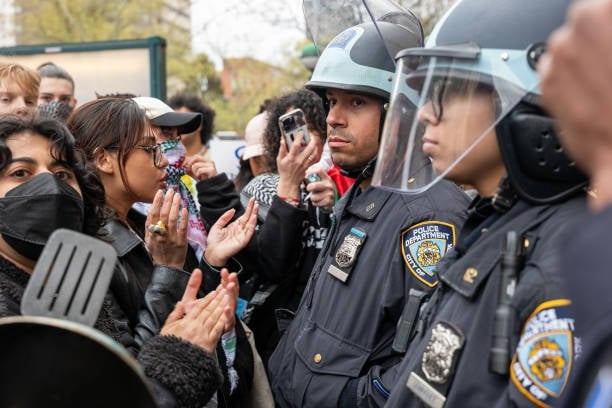You have /5 articles left.
Sign up for a free account or log in.

Shafik authorized police to tear down the tents protesters had set up on Columbia's South Lawn. Dozens of students were arrested.
More than a hundred students were arrested Thursday at Columbia University after New York City police cleared an encampment that pro-Palestinian protesters had set up on campus early Wednesday. President Minouche Shafik, just back from testifying before Congress about antisemitism on campus, authorized the police to intervene. In an announcement Thursday afternoon, she said the decision was made “out of an abundance of concern for the safety of Columbia’s campus.” She added that protesters had received notice that they were in violation of institutional policies, including a written warning at 7:15 p.m. Wednesday that said those who stayed after 9 p.m. could face suspension.
Early Wednesday morning, about 100 protesters set up 50 tents, vowing to stay in the encampment until the university agreed to divest from companies that “profit from Israeli apartheid, genocide and occupation in Palestine,” according to the Instagram page of Columbia University Apartheid Divest, a coalition of pro-Palestinian student groups.
Videos on social media showed police officers walking into the encampment Thursday afternoon while playing an audio recording asking attendees to disperse and warning that if they didn’t, they would be arrested. According to The New York Times, the NYPD arrested enough protesters to fill at least three buses and the tents were being thrown away. A police department spokesperson told Inside Higher Ed that officials did not yet have a headcount of how many arrests had been made.
New Protest Rules
According to a Columbia spokesperson, demonstrators are also facing code of conduct sanctions. The university recently introduced new protest rules restricting the protest hours on campus from 12 p.m. to 6 p.m.; the rules also require students to register protests two days in advance.
“Students who are participating in the unauthorized encampment are suspended. We are continuing to identify them and will be sending out formal notifications,” the spokesperson told Inside Higher Ed via email.
Three Barnard College students who joined the sit-in, including Isra Hirsi, the daughter of Minnesota Democratic Congresswoman Ilhan Omar, were also suspended, according to a media advisory sent by the Institute for Middle East Understanding. The advisory said that the students received notice at 10:30 a.m. Thursday that they were being suspended, effective immediately.
Barnard, which is affiliated with Columbia, declined to provide details on “confidential student conduct proceedings,” according to an email from the college's media relations office. In a letter to campus signed by Barnard College Senior Staff, officials said Barnard students had been asked to leave the encampment and received written warnings on Wednesday that students who did not leave by 9 p.m. would be suspended. Barnard began issuing those suspensions Thursday morning.
“Now and always, we prioritize our students’ learning and living in an inclusive environment free from harassment,” the letter said. “Given the evolving circumstances at Columbia and in the area, we are working to ensure the safety and well-being of the entire Barnard community.”
The protest started the same day that Shafik appeared before Congress to testify about antisemitism and free expression on campus. While the president mostly spoke about faculty members under investigation for alleged antisemitic statements, committee member Omar pressed her regarding punishments that several students had faced for hosting a panel that allegedly included speakers known to support terrorism.
“It happened that all six students were arbitrarily targeted after the university brought in a team of private and former police investigators,” Omar said. “These investigators harassed, intimidated Palestinian students at their homes, demanded to see students’ private text messages and sent threatening emails to the leaders of those pro-Palestinian groups.”
Shafik defended the university’s response, saying that the incident was “very serious” and that students had refused to comply with the investigation, resulting in their suspensions.
On Monday, ahead of Shafik’s Congressional appearance, Columbia restricted campus access only to individuals who hold university IDs. Barnard also noted in its letter that it was temporarily restricting access to some outdoor spaces.
Columbia students are not the first to stage a sit-in on campus in hopes of forcing their institution to divest. Pro-Palestinian groups at multiple other colleges have used similar tactics, including at Smith College, where students occupied an administrative building for nearly two weeks after a committee rejected their proposal for divestment.




